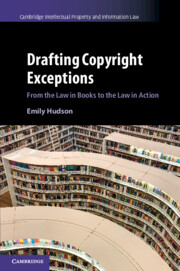Book contents
- Drafting Copyright Exceptions
- Cambridge Intellectual Property and Information Law
- Drafting Copyright Exceptions
- Copyright page
- Dedication
- Contents
- Preface
- Table of Cases
- Table of Statutes
- Part I Background
- Part II The Law in Action
- 4 Sector-Specific Exceptions
- 5 Functional Fair Use
- 6 Australian Section 200AB
- 7 Fair Dealing’s Failures?
- Part III The Future
- Appendix Empirical Methodology
- Bibliography
- Index
- Cambridge Intellectual Property and Information Law
7 - Fair Dealing’s Failures?
from Part II - The Law in Action
Published online by Cambridge University Press: 31 March 2020
- Drafting Copyright Exceptions
- Cambridge Intellectual Property and Information Law
- Drafting Copyright Exceptions
- Copyright page
- Dedication
- Contents
- Preface
- Table of Cases
- Table of Statutes
- Part I Background
- Part II The Law in Action
- 4 Sector-Specific Exceptions
- 5 Functional Fair Use
- 6 Australian Section 200AB
- 7 Fair Dealing’s Failures?
- Part III The Future
- Appendix Empirical Methodology
- Bibliography
- Index
- Cambridge Intellectual Property and Information Law
Summary
The previous chapter discussed Australia’s experiment with homegrown ‘flexible’ drafting in section 200AB. But Australia, like other countries whose copyright laws derive from the Imperial Copyright Act 1911, also recognises fair dealing exceptions. In its original statutory form in the 1911 Act, the relevant text stated that there was no infringement by any ‘fair dealing with any work for the purposes of private study, research, criticism, review, or newspaper summary’. In the intervening years, fair dealing provisions have become more complex. In Australia, Canada and the United Kingdom, for example, they are longer, split across multiple provisions in the copyright statute and are more particularised. That said, the central requirement of fairness is suggestive of a standard, and this open-ended concept, combined with the introduction of new fair dealing purposes, raises the question of how much day-to-day fair dealing practices overlap with fair use activity in the United States.
- Type
- Chapter
- Information
- Drafting Copyright ExceptionsFrom the Law in Books to the Law in Action, pp. 230 - 262Publisher: Cambridge University PressPrint publication year: 2020



